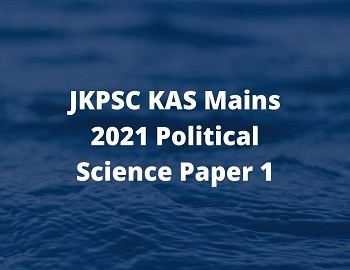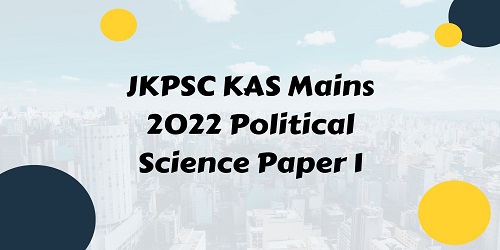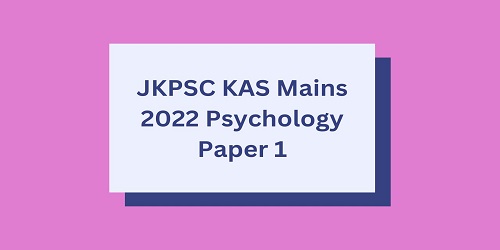JKPSC KAS Mains 2021 Political Science Paper 1:
INSTRUCTIONS
Please read each of the following instructions carefully before attempting the paper.
(i) There are eight questions divided in two Sections and printed in English. Candidate has to attempt Five questions in All. Questions No. 1 and 5 are compulsory and out of the remaining, any Three are to be attempted choosing at least One question from each Section. The number of marks carried by a Question/Part is indicated against it. Answers must be written in English in Question-Cum-Answer (QCA) Booklet in the space provided.
(ii) Your answer should be precise and coherent.
(iii) If you encounter any typographical error, please read it as it appears in the text book.
(iv) Candidates are in their own interest advised to go through the general instructions on the back side of the title page of the Answer Script for strict adherence.
(v) No continuation sheets shall be provided to any candidate under any circumstances.
(vi) No blank page be left in between answer to various questions.
SECTION- A
1. Comment on the following in about 150 words each: (5 x 10 = 50)
(a) Explain the behavioural approach in Political Science. (10)
(b) Comment on the concept of “There Is No Alternative (TINA)” in neoliberal state. (10)
(c) Why John Rawls calls justice as fairness? (10)
(d) Are liberty and equality incompatible? (10)
(e) Explain “Polyarchy” as given by Robert A.Dahl. (10)
2. (a) Examine the relationship between power and hegemony. (20)
(b) “A State exists for the sake of good life and not for the sake of life only” (Aristotle). (15)
(c) Discuss the liberal views on feminism. (15)
3. (a) Discuss J.S Mill’s notion of liberty. (20)
(b) Write the relevance of Gandhian ideas in the contemporary times. (15)
(c) Discuss the participatory model of democracy. (15)
4. (a) “John Locke’s theory of right to private property is a justification for modern capitalism”. Elaborate. (20)
(b) Discuss the neo-Marxian perspective of Gramsci. (15)
(c) Explain the rules of power politics as given by Machiavelli. (15)
SECTION- B
5. Comment on the following in about 150 words each: (5 x 10 = 50)
(a) Write a short note on peasants and workers movements during India’s freedom struggle. (10)
(b) Write down the salient features of Indian Constitution. (10)
(c) Elaborate the basic structure doctrine as articulated by Supreme Court of India. (10)
(d) Discuss the role of Parliament in law making process. (10)
(e) Mention three Contemporary challenges of the Panchayati Raj Institutions in India. (10)
6. (a) Rise of BJP represents another phase of “one party dominance system” in Indian politics. Discuss. (20)
(b) Comment on the rising centralizing tendencies of Indian federalism. (15)
(c) Critically analyse the role of NITI Aayog. (15)
7. (a) Discuss Major social movements associated with environmental protection in India and their contributions. (20)
(b) Discuss liberalization and economic reforms in the context of agriculture and farmers issues. (15)
(c) State the role of National Human Rights Commission in India. (15)
8. (a) Examine the working of Coalition Politics in India since 1989. (20)
(b) Discuss the success and failures of the Nehruvian model of development. (15)
(c) The provision of Directive Principles of State Policy is premised on making India a welfare state. Comment. (15)









Comments (No)